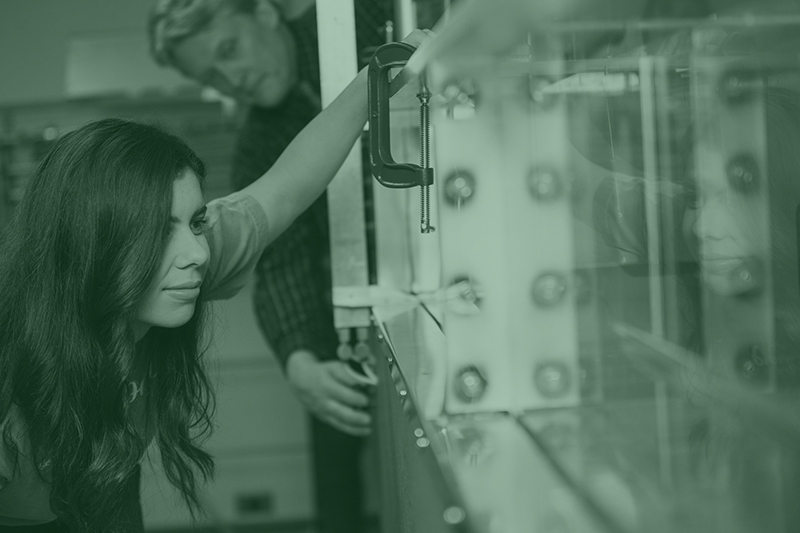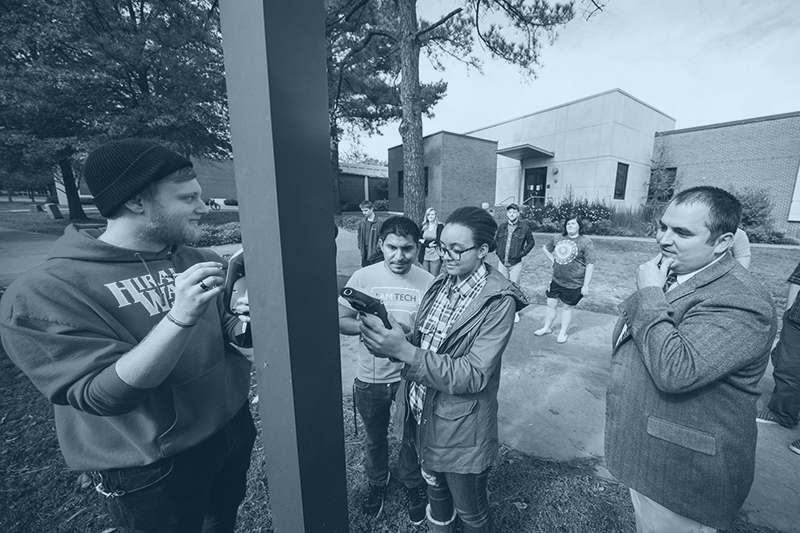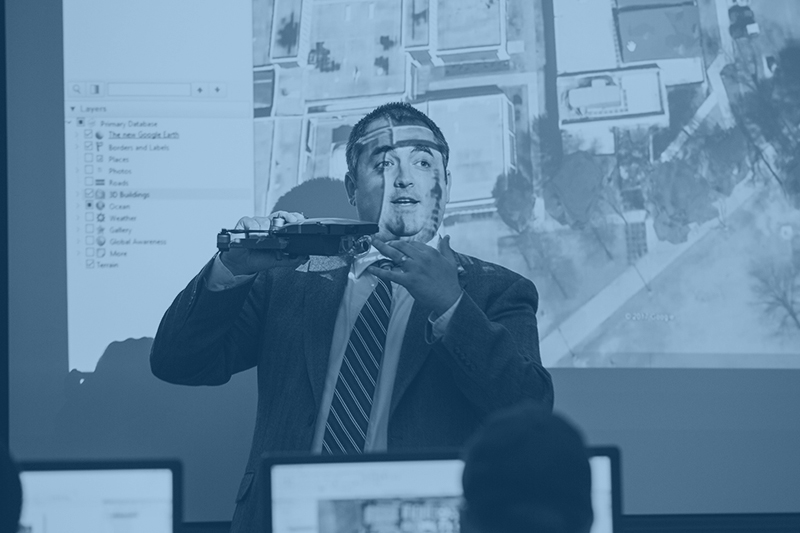STEM @ ATU
Steps to strengthen existing programs and create innovative new programs have provided Arkansas Tech with the academic framework to continue its STEM leadership far into the future. Next steps will include facility improvements and a greater emphasis on research by students and faculty.
The outcome of these efforts will be a better trained workforce of Arkansans — 92 percent of ATU students are from inside the state — who are ready to provide the skill and leadership necessary to attract and retain more high-paying jobs for Arkansas.
Science, Technology, Engineering & Math in Arkansas
In 2011, Gov. Mike Beebe and his workforce cabinet introduced STEM Works, a project that included an overhaul to how STEM education was delivered to high school students and an effort to increase the number of prepared STEM teachers.
Gov. Asa Hutchinson was elected in 2014 on a platform that included computer coding education for every child in Arkansas, and that vision has come to fruition through enhanced K-12 computer science curriculum.
The math on why these efforts are important is not complicated. A 2016 report from the Arkansas STEM Coalition shows that average earnings for STEM jobs inside the state are $30.63 per hour. The average hourly wage for all other jobs in Arkansas is $15.42.




“Computer literacy in the 21st century will have comparable importance to the ability to read and write,” said ATU President Dr. Robin E. Bowen. “It will be an essential skill set for professionals in every walk of life. The communities, states and nations that invest in computer science education today will prosper tomorrow.“That is why Arkansas Tech University committed itself to producing computer science teachers for our K-12 schools by establishing a computer science education bachelor’s degree in fall 2016. It’s why we offer a bachelor’s degree in game and interactive media design to engage and inspire a generation that can solve problems through the application of virtual realities. It is part of an overall commitment our university has made to keep the tech in Arkansas Tech by investing in technology-based programs that will create a workforce that is prepared to solve the problems of today and tomorrow.”
New Programs @ ATU
Academic innovation is allowing ATU to meet the ever-changing educational needs of individuals, private business and the public sector.The ATU College of Business offers a distinctive Bachelor of Science in Business Administration degree in business data analytics. First offered in fall 2012, it is the only program of its kind in Arkansas.
Graduates of the ATU business data analytics program are taught to manage and analyze data to create business intelligence, provide data-driven ideas for business solutions and strategies, communicate insights using business terms and creative data visualizations and apply critical thinking and moral reasoning to the analysis and interpretation of data.
The recent wave of program additions has also included a Bachelor of Arts degree in cultural and geospatial studies. Since its debut in fall 2015, the program has provided students with marketable skills in geographic information systems (GIS) while also providing methods of identifying, analyzing and solving problems utilized by geographers and anthropologists.
The U.S. Department of Commerce reports that STEM occupations are projected to grow by 8.9 percent from 2014 to 2024, compared to 6.4 percent growth for non-STEM occupations.
Potential career fields for graduates of the cultural and geospatial studies degree include economic development, city and regional planning, cultural resource management, natural resource management, transportation networking, food distribution, real estate, education and heritage preservation.
Fall 2016 may one day be remembered as a critical acceleration point in the commitment to STEM at ATU.
It was then that bachelor’s degrees in game and interactive media design, environmental science, electrical engineering biomedical option, computer science education, chemistry education and physics education all made their debut on the Russellville campus.
Students have been particularly intrigued by the game and interactive media design program, which already has 75 majors in just its second year of existence.
A report sponsored by the Herjavec Group, a leading global information security advisory firm, revealed global annual cybercrime costs will grow from $3 trillion in 2015 to $6 trillion annually by 2021.
ATU has created lab spaces in Norman Hall and the Rock House at the corner of North Arkansas Avenue and West L Street to accommodate the demand for the program.In addition to the video game and entertainment fields, other career paths for graduates of the game and interactive media design program could include animation, simulation programming, web design and interactive visualization construction.
Fall 2017 brought the debut of bachelor’s and associate’s degrees in cybersecurity at ATU.
“Our cybersecurity degrees were developed in response to the unprecedented rise in cyber threats nationwide,” said Dr. Mohamed Abdelrahman, vice president for academic affairs at ATU. “These programs will prepare graduates to understand how a threat occurs, how to prevent a threat and how to recover from a threat.”
ATU students are preparing to fill some of those jobs under the leadership of faculty in the Department of Computer and Information Science.
The Ozark Perspective
“To me, nearly everything we do here is STEM-related,” he said.
Murders explained that programs traditionally thought of as vocational are now evolved courses of study that prepare graduates for technology-driven fields. He cited disciplines such as automotive service technology, collision repair and welding as some of the programs that are rapidly moving in that direction.
“These programs now require more computerized equipment so that we may teach and practice in industry-standard environments,” said Murders. “In addition, students in fields related to automotive repair now require more computer operations classes because they are essentially running networks through diagnostic machines, in many cases wirelessly.”
Computer information technology is another STEM program at ATU-Ozark. Like many programs at ATU, it is a stackable degree that offers opportunities at the Certificate of Proficiency, Technical Certificate and Associate of Applied Science levels with the option to continue on to the pursuit of a four-year degree in related fields such as cybersecurity.
Murders explained that computer information technology graduates from ATU-Ozark can attain career opportunities ranging from help desk workers to network designers.
“CIT is a broad degree,” said Murders. “It’s almost like a medical doctor in the sense that you can become a doctor, but if you want to specialize you go to a lot more school. You get a great overview of programming, networking, web design and multimedia in our program. We put graduates in position to be a general practitioner in computer information technology and give them the chance to go on into specialty areas such as networking, programming and coding software.”
Much of the evolving technology emphasis at ATU-Ozark centers around the concept of automation technology. That vision has extended to the Arkansas Tech Career Center (ATCC) in Russellville, where a new automation technology lab opened in fall 2017 and will prepare both secondary and adult learners for the next generation of jobs in industry. A similar effort will begin in Logan County when ATCC opens a new satellite campus in Paris in 2018.
“Historically and today, there have been a lot of good job opportunities in industry that were essentially facilities maintenance,” said Murders. “That’s still a big part of it, but as some of the equipment has become more automated and now includes robotic arms, now we need people who have the skills to maintain and program that equipment. You might have a contract with Ford to make Ford parts, and then the next day you might be making parts for Harley-Davidson. Industry has to be able to make those quick and accurate adjustments, and we are in the business of producing graduates who can.”
Yesterday, Today and Tomorrow
Then there are the tried and true STEM programs for which Arkansas Tech was known long before the STEM acronym permeated our culture.There’s also the study and practice of engineering, which has been part of the curriculum at Arkansas Tech since the late 1920s. There are almost 600 undergraduate engineering majors at ATU in fall 2017 when all the various iterations of electrical and mechanical engineering are considered.
Dr. Patricia Buford, associate dean of engineering and professor of electrical engineering at ATU, has been a member of Tech’s engineering faculty since 2000.
“I think the main thing we try to do in engineering, and really all across the college, is to have that personal relationship with students,” said Buford. “Our faculty are available to students. When prospective students come on recruiting trips, if they request to meet with us we give them the gold carpet treatment to let them know that we care about them. We want their success as much as they do.”
Methods in maintaining that connection with students include making them part of faculty research initiatives. In addition, the engineering departments seek out industry partners so that senior design projects have real-world applications.
The ATU College of Engineering and Applied Sciences has also developed an engineering learning and living community at Jones Residence Hall. Resources there include four high-performance computers, a three-dimensional printer, white boards, a conference table and evening calculus tutoring.
“The problem is many students want to be an engineer, but not all of them know what it means to be an engineer,” said Buford. “For those students who arrive without the fundamentals, we do our best through the introduction to engineering course and other initiatives to catch them up to where they need to be in order to be successful. It is very mathematics-based. We want to ensure that students have the desired result, and we do everything we can to nurture that along.”
“It is very important to have hands-on, practical experience,” said Buford. “That’s one of the things we strive for here at Arkansas Tech. We have course-embedded labs because it’s one thing to read about it, but if you do it, you know it. That’s really our goal.”
As the engineering programs continue to grow and evolve, they face the need for more space to carry out their mission.
“We have grown so much and we have this tsunami of engineering students, so our problem now is we are resource limited as far as research labs,” said Buford. “Our current labs are not large enough. Facilities are our main problem. We have more faculty, but we have no place to put their offices. It’s a space issue.”
Undeterred by that obstacle, the engineering programs continue to do their part in contributing to the No. 1 goal of every program at Arkansas Tech — student success.
“Students want to go somewhere where they feel at home, where they feel welcome and where they feel cared for,” said Buford. “There is a plethora of Arkansas students, and I think we serve the state in the best capacity possible by grooming our homegrown students. Employers love our students. When our faculty went around at our career fair (during the fall 2017 semester), the employers told us our students are always the best prepared. There are a lot of facets to success. The work that our Norman Career Services office does and that so many other resources on campus do to prepare our students is essential to student success at Arkansas Tech.”
No amount of technological advances will change that focus at ATU, where the pursuit of student success was, is and will be the driving force behind each evolution in an effort to ensure that every student counts.
